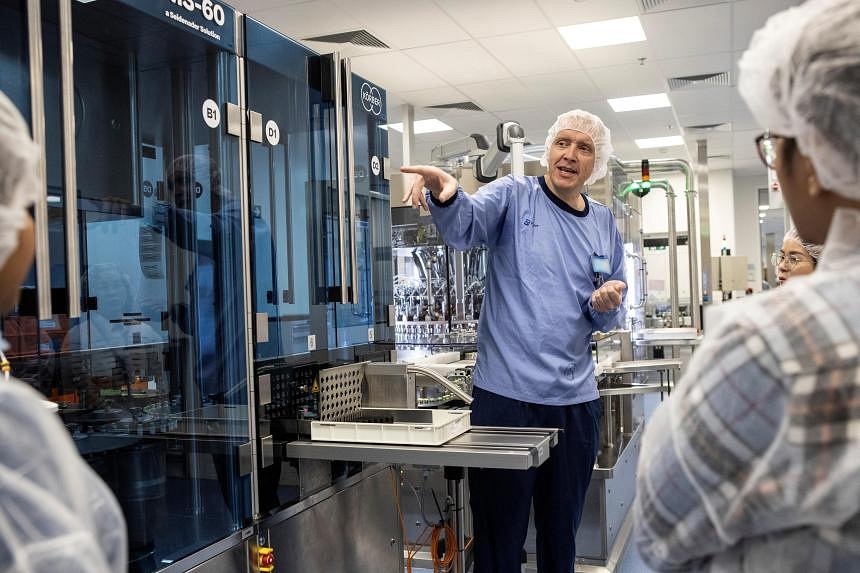BRUSSELS – Biopharmaceutical company Pfizer said its two-in-one vaccine will be moving into a final-stage trial in the coming months, after an early to mid-stage (phase one and two) study showed positive results.
With this, Pfizer and its German partner BioNTech come a step closer to potentially getting regulatory approval for a combination shot for Covid-19 and the flu.
The initial trials were carried out among healthy adults, aged 18 to 64, who showed robust immune responses against influenza A, influenza B and Sars-CoV-2 strains after receiving the combined shot. Trial participants were compared with those administered a licensed influenza vaccine and the Pfizer-BioNTech Omicron BA.4/BA.5-adapted bivalent Covid-19 vaccine at the same visit.
“We are encouraged by these early results. This vaccine has the potential to lessen the impact of two respiratory diseases with a single injection and may simplify immunisation practices for providers, patients and healthcare systems all over the world,” said Dr Annaliesa Anderson, senior vice-president and head of vaccine research and development at Pfizer.
Dr Anderson added that the mRNA-based vaccines demonstrated the ability to induce robust antibody responses. “We look forward to starting phase three clinical development,” she said.
The messenger RNA (mRNA) in a vaccine “teaches” cells how to make copies of the spike protein on the viruses in question, so that the body can recognise the real viruses if exposed to them, and fight them. After the mRNA delivers the instructions, the cells then break it down and get rid of it.
Pfizer is also finalising phase three trials of its mRNA vaccine against influenza for adults.
Revealing this last Tuesday, Dr Julia Spinardi, its senior medical director for Covid-19 in emerging markets, said the trial evaluates the efficacy, safety, tolerability and immunogenicity of the mRNA influenza vaccine.
“The phase three trial has been conducted only in the United States to take advantage of the flu season (there). We had around 36,000 participants and more than 200 sites, and we are expecting to have results pretty soon to be presented to the FDA (Food and Drug Administration),” she said.
She was speaking by video conference to a group of about 10 journalists from South-east Asia at Pfizer’s media educational visit to Brussels and its plant in Puurs that took place from Monday to Wednesday last week.
Calling influenza the “holy grail of vaccine science for decades”, Dr Mark Fletcher, Pfizer’s medical and scientific affairs lead for respiratory vaccines, said that every time there is a new technology, scientists try it on influenza.
“Now (that) we have the mRNA technology, which has been profoundly important for Covid-19, it (has) kicked off mRNA programmes and development (for) Pfizer to tackle,” he said.
“One other thing that is remarkable about the mRNA technology is it allows the concept of combination (with other vaccines). You can actually target different viruses in a single injection with mRNA. Influenza is one of them.”
Pfizer’s chairman and chief executive Albert Bourla said in January at the 41st Annual JP Morgan Healthcare Conference that the company could launch the two-in-one vaccine in 2024.
Pfizer is not the only company that has been studying the combination vaccine against both the flu and Covid-19. US-based Moderna is also working on one, and dosed its first participant in a phase three clinical trial last Tuesday.
While Covid-19 is no longer considered a public health emergency, experts continue to warn individuals and governments against complacency.
Professor Tikki Pangestu, a visiting professor at the National University of Singapore Yong Loo Lin School of Medicine, who also spoke at Pfizer’s media educational visit, said: “The worry about the situation is that in the coming months, and perhaps the coming year, there is going to be a bit of under-reporting (of Covid-19). I think it’s already happening. With the drama of a pandemic gone and the authorities declaring that Covid-19 is endemic, much like the ‘ordinary flu’, the main worry starts.”
Prof Pangestu added: “Governments, when they think the emergencies are over, pull back. That’s the worst thing you can do – to go and dismantle the infrastructure that they had put in place, because the next pandemic is a question of ‘when’. It’s not a question of ‘if’. It is still absolutely critical to track the variants, yet surveillance and reporting have already fallen.”
Covid-19 remains a major public health priority worldwide, with about 700 million cases and six million deaths so far. Numbers are still rising, with about 700,000 new cases a day in the US alone.
“The new variants can potentially increase the spread of the virus, and maybe severe disease, even in populations with pre-existing immunity. We hope it doesn’t happen, but (the virus) is unpredictable and can give us surprises that we don’t want, so vaccination remains a public health priority,” Prof Pangestu said.
Infectious diseases doctor Leong Hoe Nam from Rophi Clinic in Singapore, who also spoke during the visit, said “non-vaxxers” have fallen prey to both vaccine hesitancy and misinformation.
“They use the word ‘expert’ to support their narrative; this small circle who said people are being forced to be vaccinated. I do not believe in forcing people for vaccination, but we need to get the economy working, we need to get the country to move on,” he said.
Dr Leong said that in this “endemic” phase, the ground is still fertile for both infection and miscommunication, with information or misinformation coming from social media, providing for subsequent vaccine hesitancy.
Prof Pangestu, citing the example of a measles outbreak in the Philippines in 2018, said there was a lot of misinformation during that period, and the number of people getting their jabs against infections, such as flu, pneumococcal and especially measles, fell.
A 2022 report in weekly peer review journal Lancet revealed that the number of reported measles cases in the Philippines soared from 2,428 in 2017, to 20,827 in 2018, and 48,525 in 2019.
“This is a disease that’s totally preventable by vaccination, so it is totally morally unacceptable,” said the professor.
Dr Leong said: “Vaccine hesitancy continues to be a major concern. To fight this, we need to provide access to scientifically proven and accurate information to stave off misinformation and social media. We (also) need to address the misinformation, debunk lies and fake news, and create accuracy literacy among the community.”


